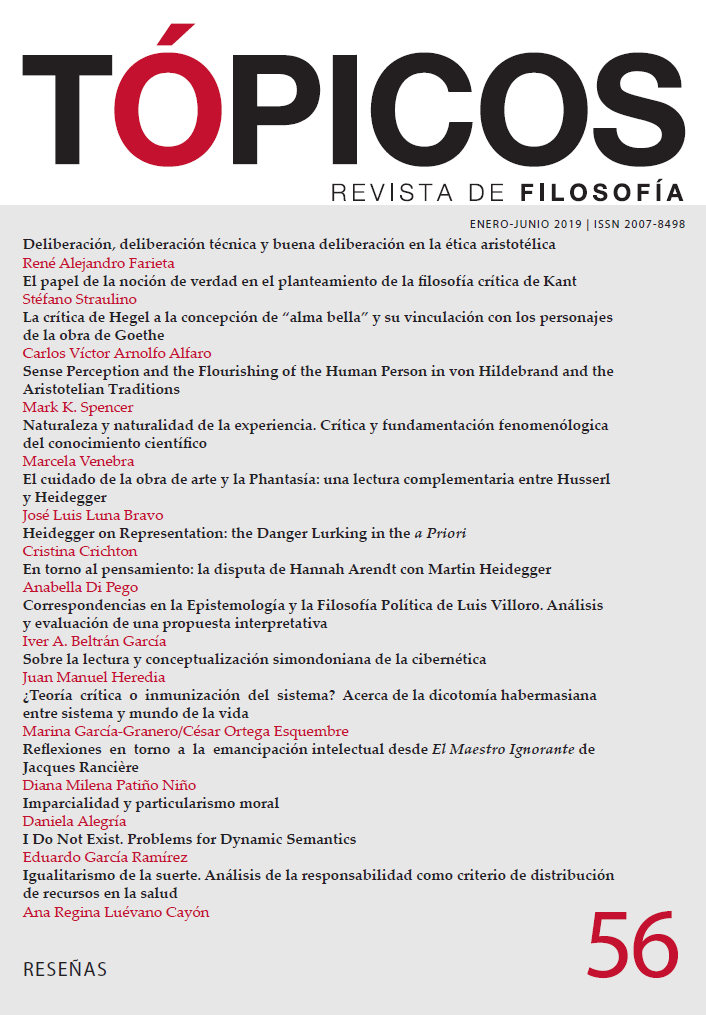Publicado 2018-12-13
Palabras clave
- obra de arte,
- ser-creación,
- cuidado,
- Phantasía,
- verdad.
Cómo citar
Resumen
En su ensayo sobre “El origen de la obra de arte” Heidegger se ocupa de dos dimensiones fundamentales de la obra, por un lado, su estar-en-sí-misma, y por otro lado su sercreación. A pesar de que el ser-creación de la obra no se refiere exclusivamente a la función que cumplen los creadores, sino que le pertenece con igual carga esencial a la labor de los cuidadores [Bewahrenden], estos últimos quedan poco explorados. El presente artículo profundiza precisamente la dimensión del cuidado de la obra. A partir de la exposición de las ideas más relevantes que Heidegger desarrolla al respecto, se plantea a la Phantasía –tomando en cuenta las descripciones de Husserl– como el modo fundamental en el que el cuidador lleva a cabo el cuidado de la obra.
Referencias
- Bernet, R. (2011). Phantasieren und Phantasma bei Husserl und Freud. En C. Sternad & G. Pöltner (eds.) Phänomenologie und Philosophische Anthropologie. Würzburg: Königshausen u. Neumann.
- Bernet, R., Denker, A., & Zaborowski, H. (eds.) (2012). Heidegger und Husserl. Freiburg; München: Karl Alber.
- Escudero, J. A. (2016a). A la búsqueda de un diálogo entre Husserl y Heidegger. En J. A. Escudero (ed.) Heidegger – Husserl. Vol. V (9–34). Buenos Aires: Teseo; SIEH. (ed.)
- ----(2016b). Heidegger – Husserl (Vol. Volumen V). Buenos Aires: Teseo; SIEH.
- Fink, E. (1966). Studien zur Phänomenologie. 1930-1939. Den Haag: Martinus Nijhoff.
- Heidegger, M. (1977). Holzwege. Frankfurt am Main: Klostermann.
- ----(1989a). Nietzsches Lehre vom Willen zur Macht als Erkenntnis (Sommersemester 1939). Frankfurt am Main: Klostermann.
- ----(1989b). Vom Ursprung des Kunstwerks: Erste Ausarbeitung. Heidegger Studies, 5, 5–22.
- ----(2006). El origen de la obra de arte. Primera versión. Revista de Filosofía. Universidad Iberoamericana., 115, 11–34.
- ----(2007). De la esencia de la verdad. Sobre la parábola de la caverna y el Teeteto de Platón. Lecciones del semestre de inviernos de 1931/32 en la Universidad de Friburgo. A. Ciria (trad.). Barcelona: Herder.
- ----(2010). Caminos del bosque. A. Leyte & H. Cortés (trads.) Madrid: Alianza.
- ----(2016). Vorträge. Teil 1: 1915 bis 1932. Frankfurt am Main: Klostermann.
- Held, K. (2012). Husserl und Heidegger über den Anfang der Philosophie. En R. Bernet, A. Denker, & H. Zaborowski (eds.) Heidegger und Husserl (pp. 69–86). Freiburg; München: Karl Alber.
- Husserl, E. (1980). Phantasie, Bildbewusstsein, Erinnerung. Zur Phänomenologie der anschaulichen Vergegenwärtigungen. Texte aus dem Nachlass (1898-1925). E. Marbach (ed.) Den Haag; Boston; London: Martinus Nijhoff.
- ----(1989). Aufsätze und Vorträge: (1922 - 1937). T. Nenon & H. R. Sepp (eds.) Dordrecht: Kluwer.
- ----(1994). Briefwechsel. Band III/7. Wissenschaftlerkorrespondenz. K. Schuhmann & E. Schuhmann. (eds.) Dordrecht; Boston; London: Kluwer Academic Publishers.
- Luft, S. (1999). Husserl on the Artist and the Philosopher: Aesthetical and Phenomenological Attitude. Glimpse, 1, 46–53.
- Mendoza Canales, R. (2015). Edmund Husserl: Phantasía e imaginación. Estudio sistemático del rol y la evolución de las presentificaciones intuitivas en el tránsito hacia la fenomenología trascendental (1898-1913). Barcelona: Universidad Autónoma de Barcelona.
- Merleau-Ponty, M. (1993). Fenomenología de la percepción. Buenos Aires: Planeta.
- von Herrmann, F.-W. (1980). Heideggers Philosophie der Kunst. Eine systematische Interpretation der Holzwege-Abhandlung „Der Ursprung des Kunstwerkes“. Frankfurt am Main: Klostermann.
- Xolocotzi, Á. (2008). Dos décadas de una atormentada relación: Martín Heidegger y Edmund Husserl 1909-1929. Contribuciones desde Coatepec, 15, 11–37.







